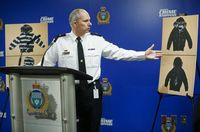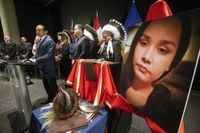WINNIPEG — In a tragic development that continues to highlight the ongoing crisis of missing and murdered Indigenous women in Canada, Ashlee Christine Shingoose has been identified as the fourth victim of serial killer Jeremy Skibicki. The announcement was made on March 26, 2025, by Cindy Woodhouse Nepinak, the national chief of the Assembly of First Nations, who expressed her condolences to Shingoose's family.
Shingoose, a 30-year-old from St. Theresa Point Anisininew Nation, was last seen near a homeless shelter in Winnipeg in March 2022. Her identity had remained unknown until now, as she was referred to as Mashkode Bizhiki'ikwe, or Buffalo Woman, during Skibicki's trial last summer. The name was given to her by an Indigenous grassroots group that aimed to honor the victims of violence.
At a news conference, Manitoba Premier Wab Kinew promised Shingoose's family that efforts would be made to search for her remains, believed to be located in the Brady landfill. “I cannot promise you that we will bring her home, but I can promise you that we are going to try,” Kinew stated, underscoring the government's commitment to addressing the issue.
Police confirmed that Shingoose was one of the four victims targeted by Skibicki, who preyed on Indigenous women at homeless shelters in Winnipeg. He admitted to the killings but claimed he was not criminally responsible due to a mental illness. A judge ultimately convicted him of first-degree murder, sentencing him to life in prison.
The investigation into Shingoose’s disappearance took a significant turn when Deputy Police Chief Cam Mackid revealed that new information obtained during a prison interview with Skibicki in December 2024 led authorities to believe that her remains had been taken to the Brady landfill. This site had previously been the location where the partial remains of another victim, Rebecca Contois, were discovered in May 2022.
Additionally, the remains of two other women, Morgan Harris and Marcedes Myran, were recovered from the Prairie Green landfill earlier this year. This grim pattern has raised alarms within the Indigenous community and beyond, prompting calls for justice and accountability.
“My heart goes out to all the families of missing and murdered Indigenous women and girls,” said Woodhouse Nepinak. She emphasized the need for an inquiry into the investigation of these women's deaths, questioning the initial response from law enforcement. “Why didn't the police service help these families right off the bat, and why didn't the previous provincial government want to help these families right off the bat?”
Initially, police had resisted searching the Prairie Green landfill for Harris and Myran, citing safety concerns. This stance was supported by the former Progressive Conservative government, which faced criticism for not taking immediate action to assist families seeking answers.
However, after Kinew's New Democratic Party won the recent election, a renewed commitment emerged. The province and the federal government each pledged $20 million to fund the search for Shingoose's remains, reflecting a shift in policy and priorities regarding Indigenous issues.
Wayne Ewasko, the interim leader of the Progressive Conservatives, publicly apologized in the legislature earlier this month, acknowledging that his party had lost its way in addressing these critical matters.
The tragic case of Ashlee Shingoose serves as a stark reminder of the vulnerabilities faced by Indigenous women in Canada. The ongoing investigations into Skibicki's crimes have sparked a broader conversation about systemic issues, including the treatment of Indigenous communities and the urgent need for comprehensive support and protection for those at risk.
As the search for Shingoose's remains commences, her family, community, and advocates are left grappling with the painful reality of loss and the hope that justice will be served. “Please start the search as soon as possible,” Shingoose's mother, Theresa Shingoose, implored in a statement read by Chief Raymond Flett, expressing her desperate wish to bring her daughter home.
The story of Ashlee Shingoose is not just about one victim; it encapsulates the broader struggles faced by Indigenous women across Canada, highlighting the urgent need for change and recognition of their rights and dignity. As the community rallies together, it is clear that the fight for justice and accountability will continue, fueled by the resilience of those who refuse to be silenced.






